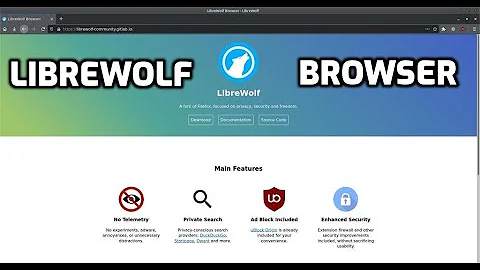How to install the LibreWolf Browser (incl. DRM support)?
The LibreWolf Documentation help with detail questions and errors. The general release side is on this Gitlab page. The specific releases can be found in their respective repositories:
-
Flatpak, the latest package can be found on this specific Release Gitlab page.
They recommend using Flathub for easier installation and updating of Librewolf when using Flatpak.
From the command line or in a Terminal:
Install:flatpak install flathub io.gitlab.librewolf-community
Run:flatpak run io.gitlab.librewolf-community — https://flathub.org/apps/details/io.gitlab.librewolf-community
(If you have not setup Flatpak, see Flatpak.org.) -
AppImage, the latest package can be found on this Release Gitlab page.
-
Download the AppImage (e.g. LibreWolf-.....x86_64.AppImage)
-
Make the file executable, e.g. in the properties of the file
-
Move the file to a folder you like it to be stored and run from
-
Download and move the LibreWolf-Icon to a folder (use “location” below, e.g. download from https://librewolf-community.gitlab.io/)
-
To be able to open it from Activities or "Show Applications", generate a Desktop-file: Open a text file (e.g. with gedit) and add to the file:
[Desktop Entry] Name=LibreWolf Type=Application Exec=PATH-TO-FOLDER-WITH-APP-IMAGE/LibreWolf.AppImage Icon=PATH-TO-FOLDER-WITH-IMAGE/Librewolf-logo.png Comment=Secure Browser Categories=Browser;Internet -
Make the Desktop-file executable, e.g. in the properties of the file
-
Move the file to ~/.local/share/applications
-
Now you can open LibreWolf like other applications
-
Debian repository for Ubuntu 20.04+ and Min 20.04
distro=$(if echo " bullseye focal impish jammy uma una " | grep -q " $(lsb_release -sc) "; then echo $(lsb_release -sc); else echo focal; fi)
echo "deb [arch=amd64] http://deb.librewolf.net $distro main" | sudo tee /etc/apt/sources.list.d/librewolf.list
sudo wget https://deb.librewolf.net/keyring.gpg -O /etc/apt/trusted.gpg.d/librewolf.gpg
sudo apt update
sudo apt install librewolf -y
-
Manual Compilation
See for more details on the project page on Gitlab. -
Binary Tarball
LibreWolf is available as a binary tarball. Check out the releases pages on Gitlab for downloads.
If you find any bug or problem, please report it on the project page on Gitlab and/or help with programming.
Some tips regarding settings you can find here on the project page.
The configuration files you can find here: /home/USERNAME/.librewolf/
Integrated and suggested add-ons are listed on this Gitlab page.
How to get DRM Compatibility
Digital rights management (DRM) is enforced off by default (this is needed for Netflix and similar); you can enable it with the following instructions:
- Open librewolf.cfg (e.g.
sudo gedit /usr/lib/librewolf/librewolf.cfg) - Under the section
Section: User Settings
-- Comment the active lines with//under the subsectionUser Settings: DRM/CDM - Main
-- Comment the active lines with//under the subsectionUser Settings: DRM/CDM - Widevine - Restart LibreWolf then open
about:preferencesand enablePlay DRM... under general section
-- LibreWolf will download Widevine and enable it (underabout:addonsplugins section) you can force the download by clicking Check for updates under the tools button
Browser doesn't restore session after restart
Preferences:
- Check
Restore previous session - Privacy & Security: Scroll to History, to the right from Clear history when LibreWolf closes find button
Settings... and uncheck:Browsing & Download history
Save passwords
Activate Restore previous session (see above) can help.
More changes are not really possible with AppImage. It is recommended to use a dedicated open source, end-to-end-encrypted password manager, more about this in this Reddit thread.
Related videos on Youtube
Comments
-
 Filbuntu over 1 year
Filbuntu over 1 yearThere is a newer browser, called LibreWolf, an independent fork of Firefox, with the primary goals of privacy, security and user freedom. It is the community run successor to LibreFox.
LibreWolf uses more than 500 privacy/security/performance settings, patches, the browser is designed to minimize data collection and telemetry as much as possible (updater, crashreporter and Firefox's integrated addons that don't respect privacy are removed).
Distrotube gives a video overview.
How do you install this browser in Ubuntu? And what about DRM support? -
 Raffles over 2 yearsAppImage is surely the easiest way.
Raffles over 2 yearsAppImage is surely the easiest way.




